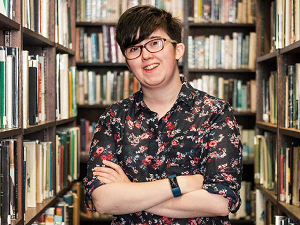
by Q Radio News
Researchers at Queen’s University Belfast are leading an international study to discover better treatments for bowel cancer.
Around 1.4 million cases are diagnosed across the globe every year with a screening programme for the over 60s helping to catch early stage cancers.
However Dr Philip Dunne at the Patrick G Johnston Centre for Cancer Research says it fails to detect a the vast majority of aggressive tumours.
The Molecular Pathologist is heading up the project which is being funded by Cancer Research UK.
The international consortium includes a multi-disciplinary team of research scientists and clinicians from across the UK and Europe.
Dr Dunne explains: “This new project aims to use state of the art molecular technologies to identify for the first time the underlying biology of these aggressive ‘born-to-be-bad’ tumours.
"This information can be used to develop clinical ‘biomarkers’ of aggressive disease that can be used to guide treatment decision making for patients in the future.”
Survival rates for patients diagnosed at the earliest stage of bowel cancer are in excess of 95%, but only in a small proportion of cases, screening identifies patients with highly aggressive tumours.
This presents a major challenge in the clinic, as current diagnostic techniques are unable to distinguish these aggressive tumours that require more extensive in-patient treatment, from patients with less aggressive tumours that can be treated as outpatients.
The bowel cancer screening programme is freely available to everyone over the age of 60, with a test being sent to your home every two years.
The test is designed for people who have no symptoms and can detect very early signs of bowel cancer, sometimes up to 10 years before the development of advanced disease.
In a lot of cases the screening test can identify non-cancerous polyps in the bowel, which, if left unchecked, may become cancerous over time; thus, preventing the cancer from ever occurring.
Dr Phillip Dunne from the Patrick G Johnston Centre for Cancer Research speaking to Q Radio

Dr Dunne added: “We would encourage everyone to use and return their bowel screening test when they receive it, as it represents an unrivalled opportunity for clinicians to identify and treat bowel cancer at the earliest stage when the disease is curable. In addition, the work ongoing within our Belfast centre is continuously optimising ways to improve treatment options for patients diagnosed with more aggressive bowel cancer.”
Dr Maurice Loughrey, Consultant Pathologist at the Belfast Health and Social Care Trust and coinvestigator within the consortium, said: “This project will bring together international clinical expertise working towards a common goal to improve patient outcome.
"The bowel cancer screening programme is saving lives by identifying very early tumours in patients with no symptoms.
"Our consortium aims to improve our understanding of how these tumours grow and develop, with results being used to guide the development of clinical trials in the near future.”
The initial phase of the Cancer Research UK-funded project will run until 2023, and work has already begun to collect clinical samples from across Europe to be centralised in Belfast for molecular profiling and analysis.
Following this initial phase, the teams of scientists will continue to collect and analyse data over the coming years to ensure that clinicians have as much information as possible to inform treatment decisions.
Dr Keara Redmond, Researcher from the Patrick G Johnston Centre for Cancer Research at Queen’s, Scientific Specialist and Project Manager in Belfast who will lead the molecular profiling, said: “This work will provide us with the largest known collection of early-stage bowel cancer samples, which will serve as an important resource for scientists worldwide to investigate this disease.
"This will enable the field to identify changes in tumour DNA, both mutations and gene activation, associated with aggressive disease.”
While the bowel cancer screening programme has been significantly affected due to COVID-related delays, it remains an important tool for preventing deaths from bowel cancer.
Michelle Mitchell, Chief Executive of Cancer Research UK, said: “Bowel cancer screening has helped save thousands of lives since it was introduced, but answering one problem in science always raises new ones.
"This international project will give us a deeper understanding of how early bowel cancer might behave, with the aim of developing new ways to help those patients with aggressive tumours who are currently slipping through the cracks.”


 UK and Irish ministers to meet amid row over migration
UK and Irish ministers to meet amid row over migration
 Three men set to go on trial for murder of journalist Lyra McKee
Three men set to go on trial for murder of journalist Lyra McKee
 Swann refuses to rule out resigning if budget is not changed
Swann refuses to rule out resigning if budget is not changed
 Fresh inquests ordered into deaths of 15 killed in McGurk’s bomb blast
Fresh inquests ordered into deaths of 15 killed in McGurk’s bomb blast